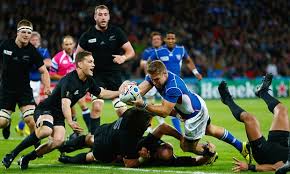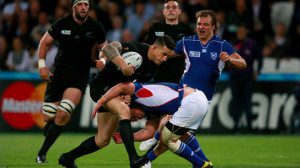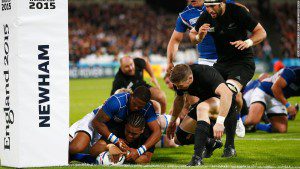

CASTRES, FRANCE – They were outclassed. They were overpowered. But, though they were beaten, battered, bruised and bloodied, Namibia refused to be bowed.
Their bodies may have weakened under 80 minutes of New Zealand pressure, but their will, organisation and discipline remained very much in tact.
And they were rewarded 10 minutes into the second half, when centre Johan Deysel ploughed through three All Blacks to score his nation’s most memorable Test try – and 50,000 spectators at the Olympic Stadium joined two million viewers back home in Namibia in a wild, wonderful yawp of joy.
There was never any chance that Namibia’s team of diamond traders, engineers, dentists and shop workers, dogged amateurs and a smattering of professionals, would repeat Japan’s shock win over South Africa. Their first World Cup win in 16 matches was never going to come on this night, against this opposition. But the 58-14 scoreline, though one-sided, was nothing like as great as almost everyone predicted. And it was nothing like as big as it appeared it was going to be in the opening exchanges.
In 2003, Australia beat Namibia 142-0. It remains the biggest mullering in World Cup history. Early on, it seemed New Zealand would overhaul that total. In 10 minutes, they were 15-0 up, as Victor Vito and Nehe Milner-Skudder both went over.
Even though this was evidently a New Zealand second-string side, featuring only two starters from Sunday’s win over Argentina, a monster win was very much on the cards.

And yes, the All Blacks ran in nine tries, headed by doubles for man-of-the-match Milner-Skudder and his opposite wingman Julian Savea. But in the right light, the 44-point margin of defeat could even look very much like a victory for the men in blue, led from the front by captain indomitable Jacques Burger and his roaring, snarling deputy in the back row Tinus du Plessis.
They marshalled and inspired Namibia so well that the monster win never materialised, even though Sonny Bill Williams offloaded superbly out of the tackle to allow Malakai Fekitoa to score under the posts before the clock ticked past the opening quarter. The All Blacks wrapped up the try-scoring bonus in the first half-hour courtesy of Beauden Barrett. Milner-Skudder completed the first-half scoring with his second try as the seconds ticked down to the break. It was 34-6.
A Namibian penalty early in the second half apparently signalled little more than defeated defiance when Julian Savea blitzed over for his 31st international try in 37 Tests – surprisingly, his first in 2015. This was the point, it seemed, that the floodgates would open.
But they didn’t.

Namibia refused to buckle. And they were not content with simply defending their hearts out. They turned down a kickable penalty in favour of a kick to the corner – much to the amusement of their coaches. Amusement quickly turned to cheers of delight as Deysel ran through Sam Whitelock and Fekitoa to score.
New Zealand wastefulness aided and abetted the Namibian resilience. This was not a classic All Black performance – it didn’t need to be. Their timing and running lines weren’t always right, their handling and passing not as precise as normal.
Even so, more illustrious sides than Namibia would have fared worse. When prop Jaco Engels was yellow carded for deliberate offside, Namibia fought on. They only conceded one try while he was in the bin, as replacement Ben Smith touched down in the corner. There’s no wonder Burger, the captain with the face that took a thousand hits, was given an ovation when he left the pitch after 65 minutes.
Savea and Taylor both scored at the death, but Namibia’s rugged determination made sure the rout never came – and gave captain Burger the confidence to issue a warning to Pool C rivals Tonga and Georgia. The Namibians are coming.
Feel free to comment below, look for and “Like” our Facebook Rugby Wrap Up Page and follow us on Twitter@: RugbyWrapUp, James Harrington, Junoir Blaber, Jamie Wall, Nick Hall, DJ Eberle, Jake Frechette, Scheenagh Harrington, Jamie Loyd, Cody Kuxmann, Karen Ritter, Audrey Young, Akweley Okine and Declan Yeats, respectively.

